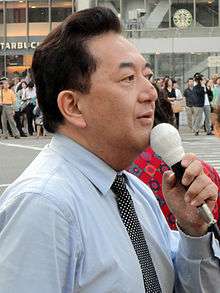Basic income in Japan
Basic income refers to a social welfare system where all citizens or residents of a country receive an unconditional lump sum income, meaning an income that is not based on need (i.e. it is not means tested). The proposal has been debated in a number of countries in recent years, including Japan.[1] (See the Wikipedia Article Basic income around the world for comparative discussion). According to Hirano Hiroya of Mejiro University, the growing debate is understandable, as social exclusion, precarity in the labor market and poverty have increased in recent decades.[2] Indeed, the state welfare system in Japan developed quite late and is still considerably less generous than in Europe, with the state playing a much smaller role in welfare provision and families, local communities and corporations play a larger role.[3] In response to the combined effects of automation and job uncertainty, two political parties support basic income: New Party Nippon and the Green Party of Japan. Japanese academics arguing for basic income include Toru Yamamori of Doshisha University and Hiroya Hirano of Nihon Fukushi University. Ronald Dore, a British sociologist specializing in the Japanese welfare state, has also been engaged in the basic income debate for many years, arguing for its implementation. The main organization promoting basic income in Japan is BIEN Japan, which is part of the Basic Income Earth Network (BIEN).[4]

History (year by year)
- 2002: The first basic income-book in Japanese, "Welfare Society and Social Security Reform: New horizon of Basic Income", is published.[5]
- 2008: The Japanese Association for Feminist Economics have its yearly meeting, with basic income as the theme.[6]
- 2009: The Democratic Party organize a meeting where 40 MP takes part. New Party Nippon includes basic income in their manifest.[6]
- 2012: Greens Japan (Japanese Green party) is endorsing basic income from its start.[7]
- 2014: Basic Income in Japan, by Yannick Vanderborght and Toru Yamamori, is the first book in English entirely devoted to the possibility for basic income in Japan.[8]
- 2015: Tomoyuki Taira, former MP, gives a BI-lecture in Tokyo on March 10.[9]
- 2016: A symposium on basic income and artificiell intelligens is arranged by "The Robotic Center".[10]
- 2017: Japanese media coverage intensifies. This includes national TV showing a short program about UBI, based on a news editor's visit to Finland and includes an interview with basic income expert Toru Yamamori.[11]
References
- "BIEN: National Affiliates". www.basicincome.org. Basic Income Earth Network. Retrieved 4 October 2018.
- Hiroya, Hirano The Potential of introducing Basic Income for the“New Public Commons” in Japan: A Road to Associational Welfare State? (read February 5, 2013)
- Kasza, Gregory James (1 January 2006). "One World of Welfare: Japan in Comparative Perspective". Cornell University Press. Retrieved 19 August 2016 – via Google Books.
- Yamamori, Dr Toru. "BIEN Japan". tyamamor.doshisha.ac.jp. Dr Toru Yamamori. Retrieved 4 October 2018.
- USBIG NEWSLETTER VOL. 5, nr. 29, sept-okt 2004
- Yamamori, Toru. "Introduction for Basic Income". www1.doshisha.ac.jp. Retrieved 2019-01-28.
- Japan party that endorses basic income has a new political platform
- "Basic Income in Japan - Prospects for a Radical - Y. Vanderborght - Palgrave Macmillan". Retrieved 19 August 2016.
- Tokyo, Japan: Thinking about Basic Income Basicincome.org February 24, 2015 (read April 21, 2015)
- AI and Basic income. Basic Income News, maj 2016.
- Yamamori, Toru. "Japan: National TV will show a short program about UBI on 27th July". www.basicincome.org. Basic Income Earth Network (BIEN). Retrieved 4 October 2018.
External links
- BIEN Japan homepage
- Universal basic income Forward-thinking or wrong-headed?,Justin McCurry, EUROBIZ Japan, 2017. Retrieved 4 October 2018.
- The push for basic income, NHK World Japan, 7 December 2017. Retrieved 4 October 2018.